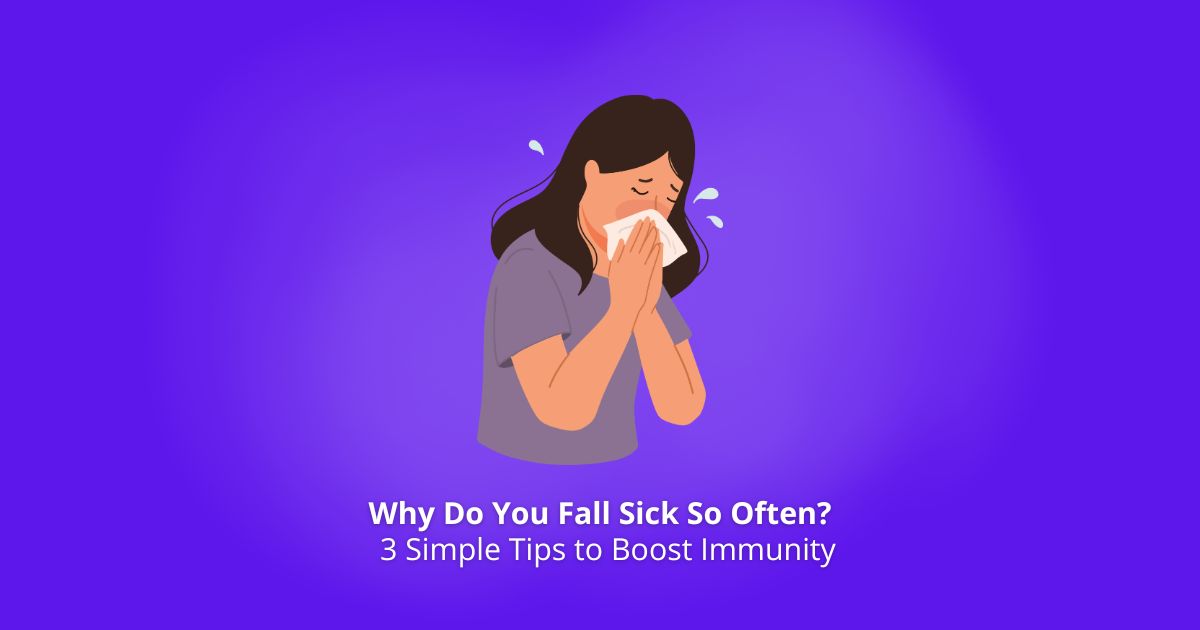Disclaimer:
This blog post is authored by an individual without medical credentials. The content presented herein is for informational purposes only and should not be considered medical advice. Readers are advised to consult with qualified healthcare professionals regarding any medical concerns or questions.
Are you someone who quickly gets cold? Taken over by constant coughing and sneezing, you can’t help but wonder why these seasonal changes hit your health more frequently than others.
Well, several factors affect immunity and make people more prone to illnesses. Swipe up to learn about these factors and how certain foods like multivitamins tablets, stress management, and exercise can help prevent frequent sickness.

How Does Your Body Fight Sickness?
Your body is like a fortress with a natural defence system called the immune system. It comprises organs and cells that constantly protect you against germs and other harmful substances and heal your body during an illness or injury.
While your immune system fights the virus and bacteria, it raises body temperature to kill the germs and produces mucus to soothe the linings. Coughing, sneezing, runny nose, etc., are all part of your body’s defences that return to normal once the bug is conquered. But as long as these symptoms last, they can turn your days into a miserable struggle.
So, if your immunity is weak, you will fall sick more often and take longer to recover. Look at the next section to know what weakens your immune system.
Factors Affecting Immunity & Tips to Manage Them
Various factors contribute to the health of your immune response. Here are the top ones, along with the tips to manage each factor:
1. Chronic Stress
Short spurts of stress are helpful for the body when you need to be alert and active. However, studies show that chronic stress lasting longer can impact your immune health, leading to more sniffles. If you are battling with constant anxiety, panic attacks, and depression, over time, it can lower your immunity and increase inflammatory markers in the body.
Management Tips
- Meditate and journal your thoughts to slow your thinking and relax your nervous system.
- Do deep breathing exercises to anchor yourself to the present moment.
- Seek help and switch your environment to avoid stressful events.
2. Daily Diet
The immune system needs specific vitamins, minerals, and amino acids for healthy functions of immune cells and appropriate immune activity. These include omega-3 fatty acids, zinc, iron, folate, selenium, copper, vitamin E, C, B6, D, A, etc.
Management Tips
- Consume fresh seasonal fruits and vegetables to get essential nutrients.
- Take multivitamins like vitamin C tablets which have been linked to multiple impressive health benefits.
- One can have fatty fish, vitamin E, and fish oil capsules to reduce inflammation and produce immune cells.
3. Age & Lifestyle
As you age, your body’s ability to ward off diseases and repair cells decreases slightly. Moreover, the kind of lifestyle you lead also determines your fitness level and susceptibility to the common cold. You can defy age but can do other things to keep your immunity at its peak.
Management Tips
- Do regular exercise and stay active. This will promote antibodies in your body and boost immunity.
- Have a sound sleep of 7-8 hours to allow your body to rest and recover.
- Cut down on alcohol and quit smoking to reduce health complications.
In Short
Low immunity can make you prone to sickness like the common cold and take longer than usual to recover. Chronic stress, diet lacking essential nutrients, and poor lifestyle can worsen immunity. Learning to cope effectively with stress by consuming fresh fruits, veggies, and supplements like multivitamins, fatty acids, and vitamin E capsules can improve your immune response so that you don’t fall sick so often.